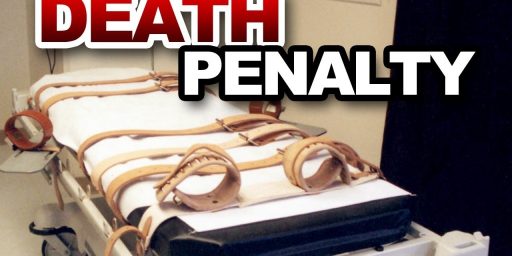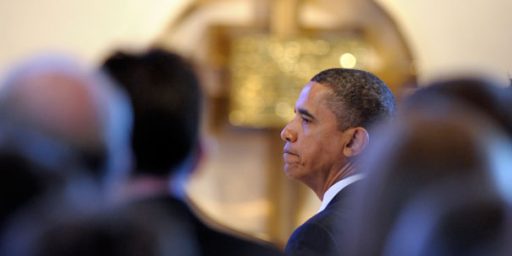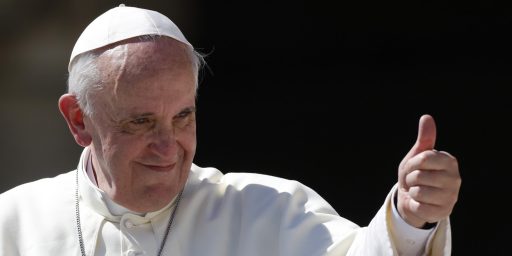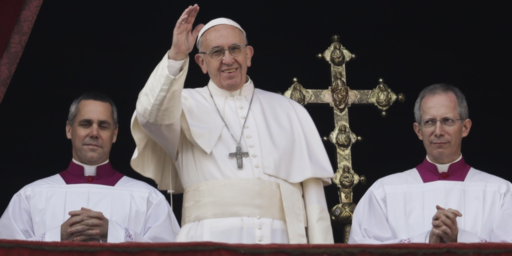Faith and Politics
Under union rules, I can mention the pope only one more time today before he gets a percentage of my BlogAds revenue. Still, this TIME story is interesting: A Test of Kerry’s Faith
The last time a major political party put forward a Roman Catholic candidate for President, he had to confront bigotry and suspicion that he would be taking orders from Rome. Forty-four years later, the Democrats are poised to nominate another Catholic—another Senator from Massachusetts whose initials happen to be J.F.K.—and this time, the controversy over his religion may develop within the Catholic Church itself. Kerry’s positions on some hot-button issues aren’t sitting well with members of the church elite. Just listen to a Vatican official, who is an American: “People in Rome are becoming more and more aware that there’s a problem with John Kerry, and a potential scandal with his apparent profession of his Catholic faith and some of his stances, particularly abortion.”
But it’s far from clear whether the greater political problem is Kerry’s or the church’s. “I don’t think it complicates things at all,” Kerry told TIME in an interview aboard his campaign plane on Saturday, the first in which he has discussed his faith extensively. “We have a separation of church and state in this country. As John Kennedy said very clearly, I will be a President who happens to be Catholic, not a Catholic President.” Still, when Kennedy ran for President in 1960, a candidate could go through an entire campaign without ever having to declare his position on abortion—much less stem cells, cloning or gay marriage. It was before Roe v. Wade, bioethics, school vouchers, gay rights and a host of other social issues became the ideological fault lines that divide the two political parties and also divide some Catholics from their church.
Kerry is a former altar boy who complains when his campaign staff does not leave time in his Sunday schedule for Mass, who takes Communion and describes himself as a “believing and practicing Catholic, married to another believing and practicing Catholic.” But just last week he made a rare appearance on the Senate floor to vote against a bill that would make harming a fetus a separate offense during the commission of a crime. The vote put Kerry on the same side as abortion-rights advocates in opposing specific legal rights for the unborn—and against nearly two-thirds of his fellow Senators.
***
If anything, the church is getting tougher. The Vatican issued last year a “doctrinal note” warning Catholic lawmakers that they have a “grave and clear obligation to oppose any law that attacks human life. For them, as for every Catholic, it is impossible to promote such laws or to vote for them.” When Kerry campaigned in Missouri in February, St. Louis Archbishop Raymond Burke publicly warned him “not to present himself for Communion”—an ostracism that Canon Law 915 reserves for “those who obstinately persist in manifest grave sin.” Kerry was scheduled to be in St. Louis last Sunday, and told TIME, “I certainly intend to take Communion and continue to go to Mass as a Catholic.”
***
How might the rift between Kerry and the church he calls a “bedrock of values, of sureness about who I am” affect the election? Catholics are among the narrow slice of the electorate considered truly up for grabs this year, and they constitute a major share of the voters in the Midwestern and Southwestern swing states. Those who are most strongly antiabortion are probably already in Bush’s camp. But many Catholics are, like Kerry, struggling with contradictions between the church’s teachings and what they practice. Still others say abortion is not the only issue that matters when they vote. “There are literally millions of American Catholics who struggle with different feelings and different issues at different times,” Kerry says. In the Democratic primaries, Kerry ran particularly strong among Catholics—winning significantly larger shares of their votes in states like New Hampshire, Missouri and Tennessee than he received from Protestants.
Catholic doctrine creates a quandry for many of its American followers, since the church’s positions on abortion, capital punishment, and the welfare state don’t line up neatly according to the Democratic and Republican party platforms.
While I’ve argued time and again in this space that religious folks have every bit as much right as any other faction in the American polity to attempt to influence the process, I’m a bit uncomfortable with the Roman hierachy issuing dictates on our elections. Still, given the church’s unwavering and deep belief that abortion is murder, it’s not unreasonable for its leaders to note that politicians calling themselves Catholic but nonetheless voting in favor of murder are in violation of the faith. Indeed, one would think Catholic voters themselves would know that. Still, a sizable percentage of American Catholics (and followers of other faiths, for that matter) see no inconsistency with thinking of themselves as faithful followers while conducting their lives in direct opposition to even its most fundamental teachings.
Update: Kevin Drum writes,
In an odd twist, at the same time that Americans have gotten over their anti-Catholic bigotry of days past the Catholic Church itself has become far more politicized. If Kerry ends up having any problems because of his faith, it’s less likely to be caused by lingering prejudice than by the church itself turning on one of its own.
Of course, that begs the question. At what point does one cease being “one of their own”? His commentators have some, erm, interesting points as well.
Steven Taylor has some thoughts on a related story.
Most recent studies seem to indicate that these calls by church leaders are falling on deaf ears. Some credible polls from a quick Google search:
-
Catholic World News : New Poll: American Catholics Less Likely To Vote With Church Teachings
CFFC Poll Report: Religion, Reproductive Health and Access to Services
The Brown Daily Herald Online: The truth about American Catholics
Again, this is also true of Protestants:






While I am an Evangelical, I am decidedly not a Fundamentalist. That notwithstanding, and despite my distaste for the shortcomings of the Bush administration, I have a hard time seeing how anyone could vote for John Kerry in November.
But to substantiate the thrust of the Slate article you link to, back when Chuck Robb was trying to hold his seat as the junior Senator from Virginia, I didn’t decide between him and George Allen until I was in the voting booth, my pen hovering between the two. Ultimately, though, I decided that my interests would best be served by Senator Allen.
Despite the fact that he’s the son of one of the most hated Washington Redskins in Cowboys circles. 🙂
a rare appearance on the Senate floor to vote
Kinda nice to see that truth included, even as offhandedly as that. It still bugs me that the fact that he almost never shows up for work is so blythely accepted, though.
As a Catholic, I don’t “politicize”‘ my voting to the extent of ‘If it contradicts any of my Church teachings, however minor, I abstain or vote against’.
OTOH, the Church’s position on abortion is anything but ‘minor’. So if Kerry wants to directly oppose it, then yes, I feel the Catholic Church has a legitimate place to comment and go ‘It might be Democratic, but it’s not Catholic. And if you don’t oppose abortion, you’re lapsing.’
*must hit preview first*
Correction to the above — that was supposed to read ‘if Kerry wants to support abortion’, not ‘if Kerry wants to directly oppose it’.
—